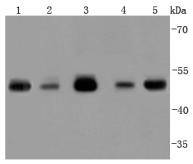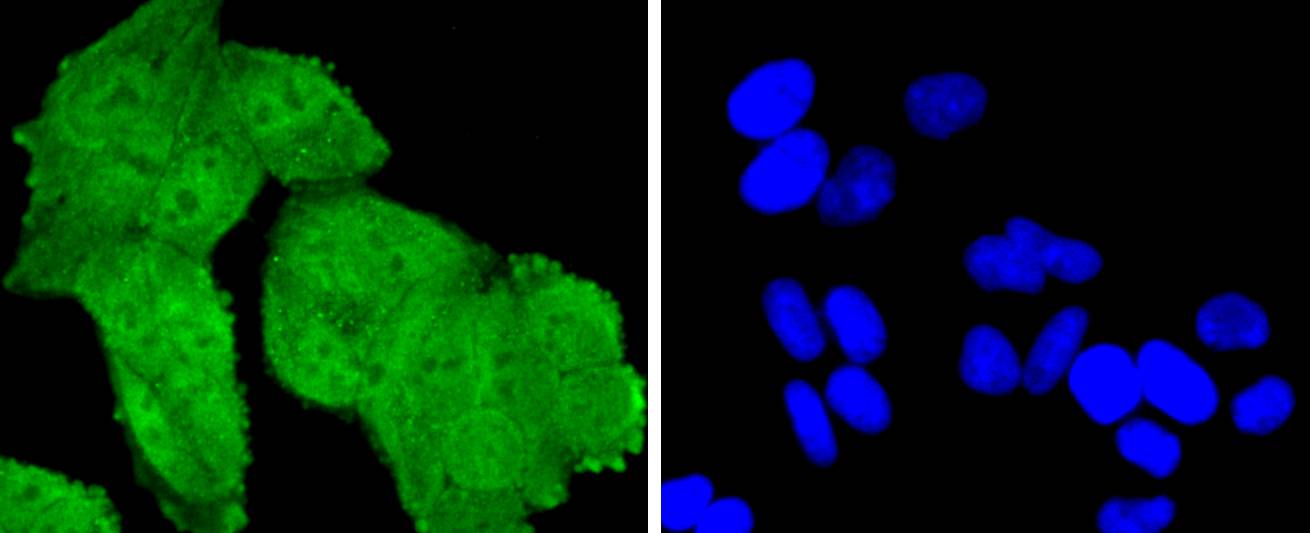Product Name :
TSG101 polyclonal antibody Background :
The transformation of a normal cell to one that is malignant can result from mutations in genes that encode proteins with key regulatory functions. Examples include the retinoblastoma gene product (Rb p110), p53, VHL and APC. Using a novel cloning strategy that allows the isolation of previously uncharacterized genes encoding selectable recessive phenotypes, an additional tumor suppressor gene has been identified. This gene, termed tsg 101 for tumor susceptibility gene 101, encodes a stathmin binding domain protein. When expression of this growth inhibitory gene is blocked in NIH/3T3 cells using antisense mRNA, the cells exhibit a transformed phenotype and are tumorigenic in SL6 mice. Product :
Rabbit IgG, 1mg/ml in PBS with 0.02% sodium azide, 50% glycerol, pH7.2 Storage&Stability :
Store at +4°C after thawing. Aliquot store at -20°C or -80°C. Avoid repeated freeze / thaw cycles. Specificity :
TSG101 polyclonal antibody detects endogenous levels of TSG101 protein. Immunogen :
recombinant protein Conjugate :
Unconjugated Modification :
Unmodification
TSG101 polyclonal antibody Background :
The transformation of a normal cell to one that is malignant can result from mutations in genes that encode proteins with key regulatory functions. Examples include the retinoblastoma gene product (Rb p110), p53, VHL and APC. Using a novel cloning strategy that allows the isolation of previously uncharacterized genes encoding selectable recessive phenotypes, an additional tumor suppressor gene has been identified. This gene, termed tsg 101 for tumor susceptibility gene 101, encodes a stathmin binding domain protein. When expression of this growth inhibitory gene is blocked in NIH/3T3 cells using antisense mRNA, the cells exhibit a transformed phenotype and are tumorigenic in SL6 mice. Product :
Rabbit IgG, 1mg/ml in PBS with 0.02% sodium azide, 50% glycerol, pH7.2 Storage&Stability :
Store at +4°C after thawing. Aliquot store at -20°C or -80°C. Avoid repeated freeze / thaw cycles. Specificity :
TSG101 polyclonal antibody detects endogenous levels of TSG101 protein. Immunogen :
recombinant protein Conjugate :
Unconjugated Modification :
Unmodification
-
 Western blot analysis of TSG101 on different lysates using anti-TSG101 antibody at 1/1,000 dilution. Positive control: Lane 1: NIH/3T3 Lane 2: Hela Lane 3: K562 Lane 4: Jurkat Lane 5: A431
Western blot analysis of TSG101 on different lysates using anti-TSG101 antibody at 1/1,000 dilution. Positive control: Lane 1: NIH/3T3 Lane 2: Hela Lane 3: K562 Lane 4: Jurkat Lane 5: A431 -
 ICC staining TSG101 in Hela cells (green). The nuclear counter stain is DAPI (blue). Cells were fixed in paraformaldehyde, permeabilised with 0.25% Triton X100/PBS.
ICC staining TSG101 in Hela cells (green). The nuclear counter stain is DAPI (blue). Cells were fixed in paraformaldehyde, permeabilised with 0.25% Triton X100/PBS.
HucMSC-derived exosomes delivered BECN1 induces ferroptosis of hepatic stellate cells via regulating the xCT/GPX4 axis
PMCID: Pubmed No.:35395830
Follicular fluid exosomes regulate oxidative stress resistance, proliferation, and steroid synthesis in porcine theca cells
PMCID: Pubmed No.:36209547
Serum exosomes from epithelial ovarian cancer patients contain LRP1, which promotes the migration of epithelial ovarian cancer cell
PMCID: Pubmed No.:36842607
Bioworld Biotech only provide peptides for our antibodies and do not provide additional peptide customization services.
Price/Size :
USD 368/1mg/vial
Tips:
For phospho antibody, we provide phospho peptide(0.5mg) and non-phospho peptide(0.5mg).Describe :
Blocking peptides are peptides that bind specifically to the target antibody and block antibody binding. These peptide usually contains the epitope recognized by the antibody. Antibodies bound to the blocking peptide no longer bind to the epitope on the target protein. This mechanism is useful when non-specific binding is an issue, for example, in Western blotting (WB) and Immunohistochemistry (IHC). By comparing the staining from the blocked antibody versus the antibody alone, one can see which staining is specific; Specific binding will be absent from the western blot or IHC performed with the neutralized antibody.Formula:
Synthetic peptide was lyophilized with 100% acetonitrile and is supplied as a powder. Reconstitute with 0.1 ml DI water for a final concentration of 10 mg/ml.The purity is >90%,tested by HPLC and MS.
Storage:
The freeze-dried powder is more stable. For short time at 2-8°C. For long term storage store at -20°C.
Note :
This product is for research use only (RUO only). Not for use in diagnostic or therapeutic procedures.
 TSG101 polyclonal antibody
TSG101 polyclonal antibody  Datasheet
Datasheet COA
COA MSDS
MSDS SHIP
SHIP